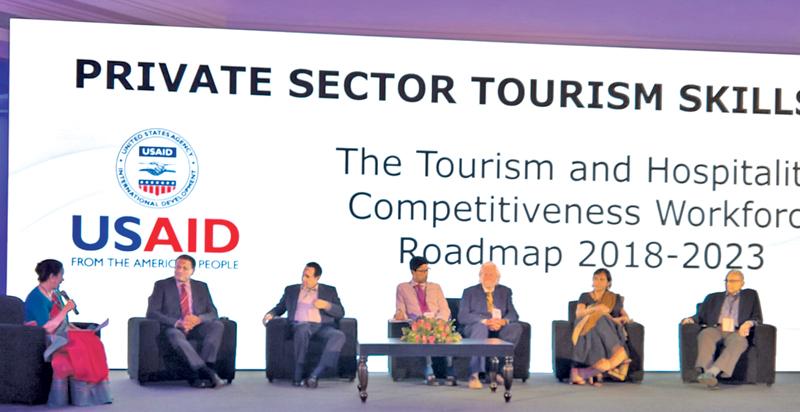
A private sector approach to address the skilled worker shortage in the tourism industry was launched as a roadmap on Sri Lanka tourism and hospitality workforce competitiveness 2018-2023 in Colombo last week.
“The initiative is a much needed effort to drive tourism growth further and to draw young blood in to the industry. It also fulfills a lacuna in the industry as private sector involvement to develop the sector was lacking. There are ample opportunities for youth in this field and we need to have strategies to attract them to the industry to make it sustainable for the future,” Tourism Skills Committee Chairman Malik Fernando said. “Sri Lanka has so many attributes that put us way ahead of the competitors.The young and talented workforce is a positive factor for tourism. As the size of the tourism market is growing, the requirement for labour becomes an increasingly important issue.
Therefore, skills development and training are essential for long term growth of the industry,” he said.The country’s tourism industry contributes 12 percent to the GDP and 5 percent to employment generation which are annually increasing. However, the women workforce in tourism in Sri Lanka is less than 10 percent. The global average is 65 percent. The total investment in the industry stands at US $ 4 billion at present. Sri Lanka is among the 22 countries in which the tourism industry grows at a fast pace.
“We have to take greater control to maintain a quality workforce in the tourism industry.
The road map is a declaration of our efforts to create a dynamic team in the industry. The initiative is an attempt to look at skills and marketing aspects in the industry which has outlined eight strategies to be achieve within a time frame. It will support to enhance the quality of hospitality training and aimed at reaching out youth through their parents and religious leaders to change the mind set of the society,” he said.
The country needs 100,000 more tourism sector employees in the next three years. Yet, we only train about 10,000 each year. We need a curricula to produce high value added youth in specialized areas. We need to look at new ways of training. It is essential to provide short-term intern leadership training programmes to bridge the skill gap in the industry, he said.
“The possibility of brain gain should be looked in to as we could bring back the qualified and well-trained staff to the country again. The existing public sector infrastructure will be used to modernize the knowledge dissemination process.
The roadmap will help decision makers to take well informed decisions as it gives a feedback on the industry. The tourism industry needs to attract more women as there is high potential for them to climb the industry ladder. It is important to have flexi working hours, safe accommodation, transport and a friendly working environment for the industry to be more appealing, he said.
The roadmap was prepared by the private sector Tourism Skills Committee with the support of the Technical and Vocational Education Commission of the Ministry of Science, Technology, Research, Skills Development, Vocational Training and Kandyan Heritage; Sri Lanka Tourism Development Authority, Sri Lanka Institute for Tourism and Hotel Management, Ceylon Chamber of Commerce and YouLead - a project funded by United States Agency for International Development and implemented by International Executive Service Corps.
The initiative, according to the Tourism Skills Committee does not purport to be a comprehensive strategy, but rather a concise, actionable implementation guide that responds to the urgent needs to meet workforce requirements over the next decade.
